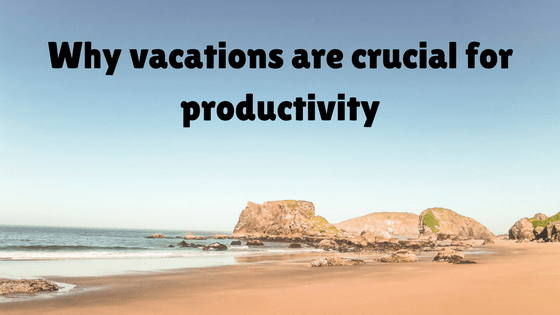Do vacations make you feel guilty?
Many of us feel guilty to take vacations. After learning time management and personal productivity, we feel like we need to be constantly working on something. It doesn’t help when we see some successful people boasting about how they never took a day off in 25 years. All of this adds to our guilt.
I too used to feel this way until I learned something very important: these folk are the exception, not the norm.
The average person needs regular breaks in order to function at 100%. This includes daily breaks, weekly days off, and at least once or twice a year, a proper vacation.
5 Benefits of taking a Vacation
Vacations are not a waste of time if done properly. A proper vacation will benefit you in the following ways: (and more)
1. They reduce stress
Perhaps the most obvious benefit of a vacation is that your stress levels are reduced significantly. Being away from the usual stresses of life gives you an opportunity to rebuild, recover, and relax. All helping you get back to your chaotic life with a healthy mind.
2. They increase happiness
A proper vacation increases happiness multiple times over. being away from your usual routine, seeing the world, and trying new things (and new food) all help to increase your happiness and overall well being.
3. They improve your health
With reduced stress and increased happiness comes improved health. Particularly, the health of your heart. Studies have shown that a good vacation reduces the chance of heart disease. This makes sense as stress is a major cause of heart problems, and vacations greatly reduce stress.
4. They help you rethink your goals and vision
One of my personal favorite benefits of a vacation is that it gives me time to reflect on my goals and vision from afar. Away from stress, business, responsibilities, and daily problems, I have more time and clarity of mind to rethink, reorganize and restructure my goals for the coming year.
In fact, I believe the final day of a vacation is probably the best time of the year to sit and organize your goals for the coming year.
5. They recharge your energy levels
Whenever I feel my energy levels dipping, I take it as my body’s natural warning that I need a vacation. Vacations are like sleep and days off, but longer. They allow your body to rest from an entire year’s worth of hard work. This allows you to return to work refreshed, recovered, and recharged.
This is why an intelligent manager will encourage their employees to take vacations when they are not operating at 100%. Because they understand the value of keeping their employees healthy, energized and focused.
You will notice that all five of these things are crucial for productivity. This is why I firmly believe that vacations are crucial for productivity.
In Part Two, we discuss tips on how to gain these benefits from a vacation.
Access Part Two here.





